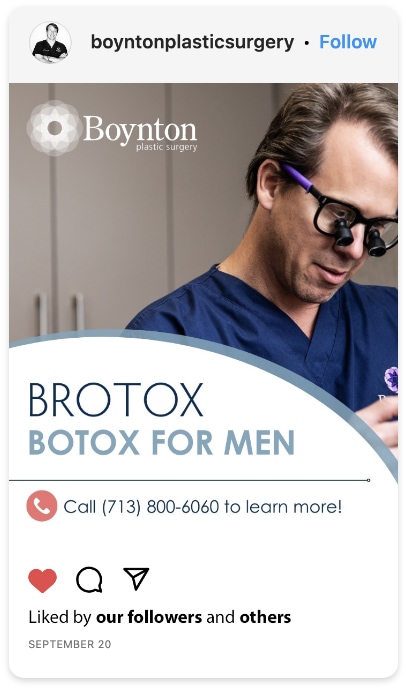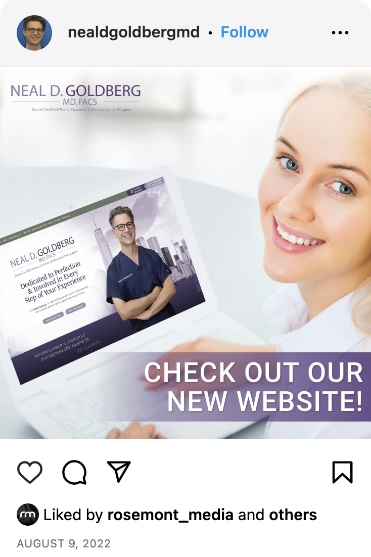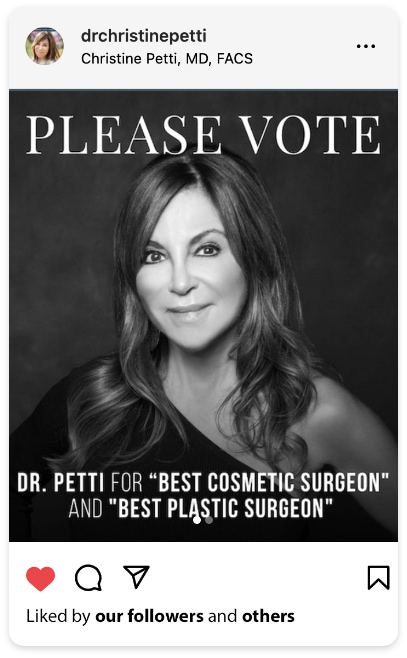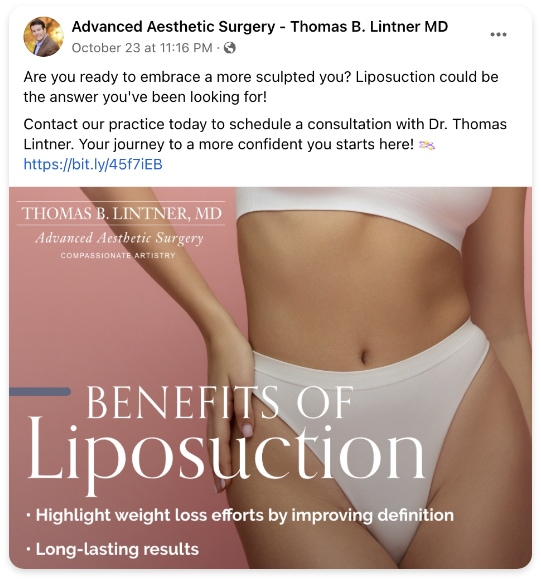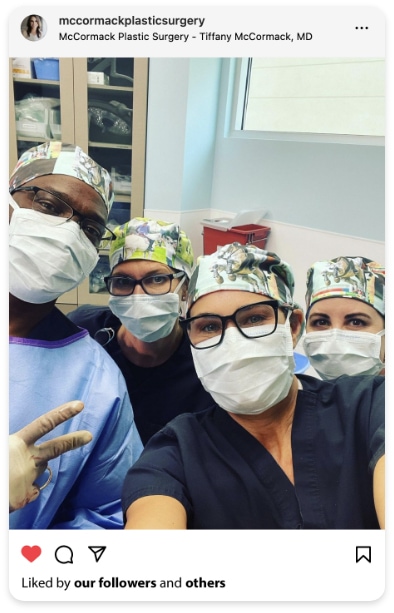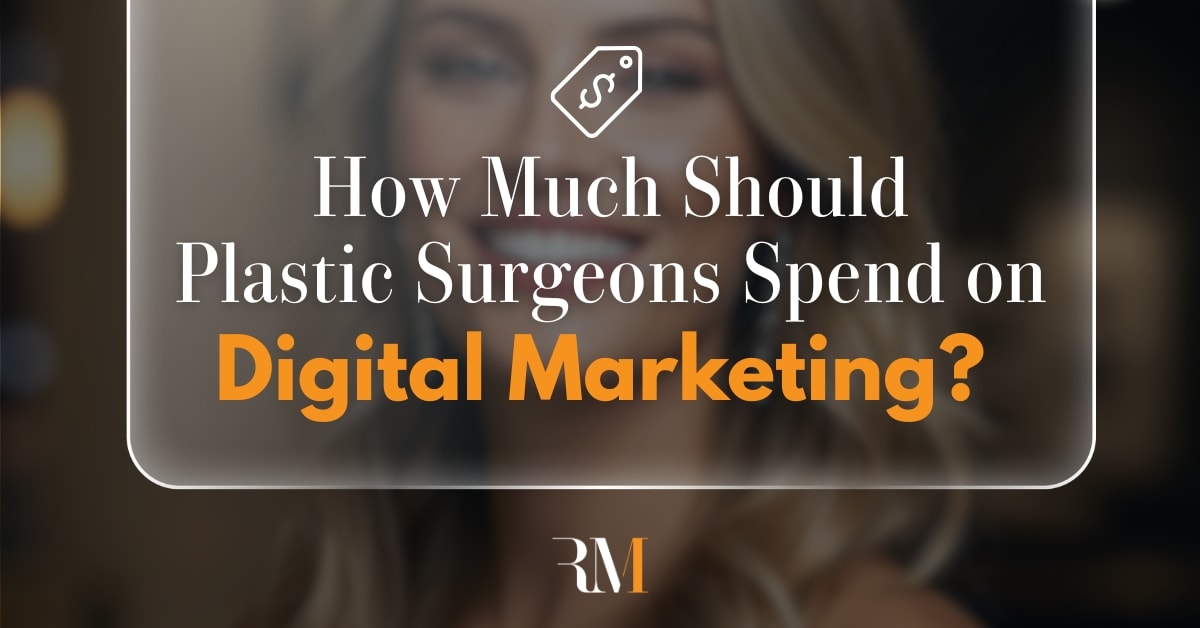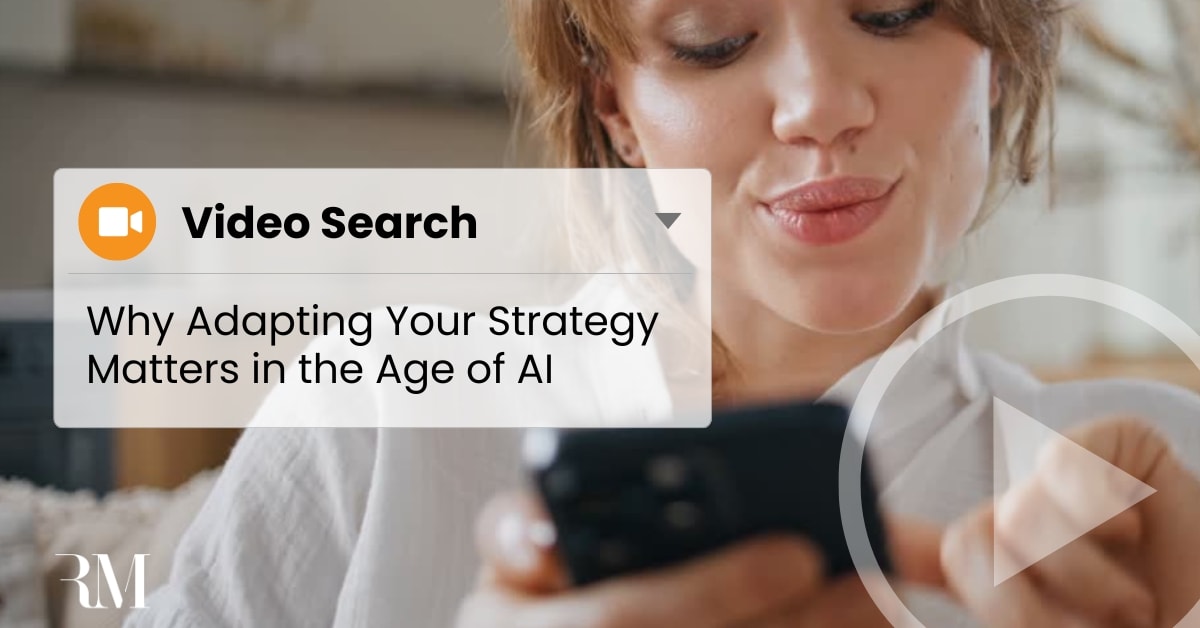Social Media Marketing for Plastic Surgeons
An effective social media strategy enables your plastic surgery practice to connect and engage with patients while enhancing your brand identity.
Social media marketing is a powerful tool for your plastic surgery practice, allowing you to develop your brand identity, strengthen connections with existing patients, attract new patients, and contribute your expertise to ongoing conversations about industry trends. While your website serves as an important informational resource about your practice and services, social media allows you to engage more directly and dynamically with your audience. Our team of specialists is equipped with an in-depth understanding of the best practices for plastic surgery social media marketing, and we are here to help you leverage all that the various platforms have to offer.
What Are the Benefits of Social Media for Plastic Surgeons?
One of the primary benefits of using social media as a plastic surgeon is the greater visibility and reach it can offer. Billions of people worldwide use platforms like Facebook and Instagram, and it is estimated that the average user spends upwards of two hours browsing their social media feeds each day. By creating and maintaining an active presence on these platforms, you are positioning yourself in front of a large audience of engaged users who may otherwise never have encountered your practice or services. An active social media presence also allows you to remain connected with existing patients, who may be more motivated to engage with your posts, write reviews, or share your content across their networks.
Another beneficial aspect of social media marketing for cosmetic professionals is its ability to establish trust and credibility with patients. Educational videos, images, infographics, and text posts allow you to showcase your expertise, while consistent branding in addition to thoughtful engagement with patient questions and comments can strengthen your practice’s online reputation. Ultimately, social media profiles provide space for surgeons to speak directly with audiences, answer questions, and review topical trends in an authentic way.
Our Plastic Surgery Social Media Services
At Rosemont Media, we offer a number of different services designed to help our clients succeed on social media. From setting up your accounts to monitoring your campaigns, our team is here to help with every step of the process.
-
Setting up your profiles
Is your practice just starting out on social media or in need of an identity refresh? Our team can create optimized business pages and profiles that showcase your unique brand identity. We offer a variety of services, including assisting you in selecting a professional profile photo, writing a custom bio, and developing a brand guide to ensure that your posts and visuals consistently reflect your practice’s identity.
-
Custom Content Creation
Your practice is unique, and your social media content provides an opportunity to showcase the qualities that set you apart. From before-and-after photos to testimonials to educational videos and infographics, our team can craft well-researched, high-quality, data-informed content designed to engage patients, build trust and credibility, and enhance brand awareness.
-
Building a Content Calendar
Consistent, timely, and relevant posts are key on social media, so our customized content calendars are designed to ensure your practice remains strategically positioned on your followers’ feeds. Each month, our experts assess current plastic surgery social media trends, industry news, important dates, and other factors to create personalized content for your practice. Our seamless approval process also ensures that you have the final say on everything that gets posted.
-
Promoted posts
Promoted posts and social media ads are an integral part of growing your audience and positioning your practice in front of potential new patients. Using advanced demographic and location data, our team can amplify your content to ensure it is being seen by the most relevant possible users.
-
Tracking and conversion
At Rosemont Media, we value transparency and a results-driven approach to marketing. Our team reviews detailed analytic and tracking information using Google Search Console, Google Analytics, and other tools to maximize your marketing efforts, make the most of your budget, and increase conversions.
Best Social Media Platforms for Plastic Surgeons
Popular social media platforms can provide a powerful marketing tool for plastic surgeons, facilitating interaction and a sense of community with existing and potential patients. When it comes to getting the most out of your plastic surgery social media efforts, our experts have found that Facebook and Instagram typically yield the greatest value; however, video-based platforms, namely TikTok, have proven increasingly effective for many plastic surgeons, as well. Depending on the platform and its features, these tools can allow surgeons to showcase their procedural options, share photos and testimonials from actual cases, and give the public a taste of their practice’s unique personality.
-
Facebook
Facebook features a robust infrastructure for ensuring your content is being amplified to the most relevant audiences. The platform is also equipped with numerous tools – such as event pages, reviews, offers, and promotional content – that your patients can use to engage with your posts. Our team can help create a customized Facebook strategy for your plastic surgery practice based on your target demographics and location. From there, we can monitor and adjust this approach over time using detailed analytics and performance tracking.
-
Instagram
Instagram marketing for plastic surgeons is more visually-oriented, making it an excellent opportunity to showcase a variety of photo and video content, including patient testimonials, before-and-after photos, office tours, team member spotlights, and more. Features like Reels and Stories give you a variety of different formats through which to engage with patients and curate your content to tell compelling stories. Plus, since Instagram is so driven by images, our savvy design team can help your practice develop a personalized brand guide to help your visuals stand out from the competition while increasing brand recognition and recall with your audience.
-
TikTok
While TikTok was initially associated with the younger generation, plastic surgeons with decades of experience have begun to embrace the platform in recent years. Known for its viral trends and challenges, TikTok allows medical professionals to post short, concise videos that can easily grab patients’ attention. This fast-growing platform makes it very easy for followers and non-followers alike to watch posts on any given page, giving plastic surgeons the chance to leave a lasting impression on their viewers.
Paid Advertising on Social Media
Plastic surgeons can leverage TikTok, Instagram, and Facebook (now Meta) paid advertising to further amplify the reach of their content. While organic—or unpaid—posts are a great way to keep your feed active and engage with your existing audience, paid ads allow you to reach a larger and more targeted demographic. Our team of specialists can work with you to get the most out of your ad budget—whether it is large or small—by creating a strategy customized to your goals.
Types of Social Media Ads
- Image ads: These types of ads feature a single image along with a caption or headline. They are designed to help make a straightforward and bold impression, and they typically display within a Facebook or Instagram user’s feed as they scroll. Ideal image ads feature well-branded, high-quality visuals with a clear, engaging, and easy-to-read headline or caption that invites further engagement.
- Video ads: Video ads allow a significant degree of creative freedom, enabling you to feature things like office tours, patient transformations and testimonials, recordings of yourself or your staff, product demonstrations, and more.
- Carousel ads: Carousel ads allow you to include multiple images or videos within the same ad “unit”—for instance, pictures of your office, introductions to different members of your team, or educational tips and tricks. Users then swipe or click through the different images, making carousel ads an important visual storytelling tool.
- Reels ads: Reels are an extremely popular area where Facebook and Instagram users spend their time. These vertical videos can significantly expand your reach.
- Stories ads: Stories ads are designed to be quick, memorable, and fun. They appear as users are browsing through the stories in their feed, so it is important to ensure that your brand is well-represented and that your ad is creative and engaging to make the greatest impact.
- Reels Ads: Short-form video content has seen a meteoric rise in popularity, and the Reels sections of both Facebook and Instagram are where many users spend the bulk of their time. These short, vertical videos are a great way to make a strong impression and drive traffic back to your page.
Types of Ad Campaigns
- Traffic: Traffic ads are intended to direct visitors back to your website or blog. These campaigns typically involve providing a short overview or “teaser” of the content or services users can find, followed by a link or call-to-action directing them to your targeted page. Traffic ads may involve trying to connect with new users, or they may include “retargeting campaigns,” which are specifically designed to get those who have previously interacted with your social media page or website to visit again.
- Engagement: Engagement campaigns encourage current and prospective patients to interact with your posts and page through likes, comments, follows, link clicks, event sign-ups, and more. They usually contain a specific call-to-action prompting users to participate in some way. Examples of engagement ads can include polls, interactive quizzes or trivia questions, educational content, event announcements, and more.
- Lead generation: Lead generation ads are designed to collect information from potential patients who have shown interest in your services. These types of campaigns encourage interested parties to fill out a contact form or reach out to your office directly. Retargeting efforts also often fall under the header of lead generation, and our digital marketing experts have numerous strategies to help you convert leads into new patients.
- Messages: Messenger ads are a way to connect with new or existing patients through Instagram or Facebook’s in-app messaging features. This can facilitate a feeling of one-on-one connection that many potential patients find appealing. It can also enable you or a member of your team—or an automated system—to answer specific questions that the patient may have about your services, credentials, or other aspects of your practice.
The Ethical Use of Social Media for Plastic Surgeons
Rosemont Media is a leading provider of medical and dental marketing services, and we understand that there are certain ethical and legal guidelines for social media in healthcare that may not exist in other industries—including Health Insurance Portability and Accountability Act (HIPAA) laws. While sharing patient stories and before-and-after photos on social media can be a major component of an effective marketing strategy, it is also important to protect patient privacy. You can trust in our experienced team to uphold the highest standards of ethics and privacy, and we can also help you navigate the process of obtaining patient consent.
To learn more, we invite you to check out our blog: How to Protect Patient Privacy on Social Media
How Is Social Media ROI Measured for Plastic Surgeons?
ROI, or return on investment, is one of the most important metrics to consider for any social media marketing strategy, since it represents the value generated by your investment. When it comes to measuring social media success for plastic surgery practices, we evaluate a number of key performance indicators (KPIs). These KPIs may include website traffic, contact form submissions, consultation requests, post engagements (likes, comments, shares), and more.
The team at Rosemont Media measures social media advertising ROI for plastic surgeons using a number of different tools. Google Analytics and Google Search Console allow us to evaluate website traffic and performance, with options to view how many visitors are coming from social media. Google Analytics allows you to add specialized codes to the ends of the URLs you use in your social posts called “UTM parameters.” These codes enable our team to see how users interact with the different links you include in your social media campaigns, as well as how they engage with your website after clicking them.
Meta Business Manager and Meta Insights can also provide helpful metrics for evaluating the performance of your social media ads and campaigns. From letting you know when your page followers are most active to tracking the reach of your ads, these tools can optimize your marketing efforts by offering helpful data about audience demographics and behaviors.

Social Media Success Stories from Our Plastic Surgeons
We love helping our clients grow their social media audiences—and their businesses as a result! We value communication, transparency, personalization, and collaboration, and our team is fully dedicated to your success. From detailed analytics reports to business branding consultations to data-driven advertising campaigns, our clients trust us to provide exceptional service while maximizing their social media ROI.
“We are covered on all platforms of social media and they keep the content fresh, which is so important on the search engines. Therefore, I highly recommend Rosemont Media for all your internet and social media needs for your practice. You will not be disappointed!”
“Rosemont has also helped us with our social media marketing which they have grown for us! We have monthly calls where we go over our analytics and site performance in addition to our social ads, which is really helpful for me in my position at the office.”
“I have been a Rosemont Media client since their inception. These people rock!!! They are available, personable, and most importantly knowledgeable! They use my money wisely in managing my website and social media presence, recognizing my unique office style and specialty. I recommend them highly to anyone well outside my business catchment area.”
“I have been thoroughly impressed with Rosemont Media’s consistent amazing communication, customer service, and beautiful work. Their team is an absolute pleasure to work with and has made the whole process easy and seamless. I can’t say enough about this amazing team and am so fortunate to be working with such an amazing company for my website, SEO, and social media presence. So glad I chose them! Would definitely recommend!!”
“The Rosemont team has been on top of all our website and social media needs. The team is very organized, knowledgeable and reliable!!! Highly recommend this team!!!”
Additional Frequently Asked Questions About Social Media Marketing
How Often Should Plastic Surgeons Post on Social Media?
It is important to regularly produce new posts on social media; however, posting too often can actually be somewhat detrimental. In fact, Facebook and Instagram may even penalize you if your account is posting more than five posts per week. With that in mind, somewhere in the range of three to five posts each week is typically in line with best practices for social media postings.
What Type of Content Should Plastic Surgeons Post on Social Media?
Testimonials, videos featuring the plastic surgeon answering frequently asked questions and explaining certain aspects of procedures, and personal posts or videos showcasing members of the team at the practice are all examples of good content that can be shared on social media. Additionally, many patients and viewers like content that is authentic to the practice, so participating in a topical social media trend (that fits with the practice’s brand and image) can be advantageous. Maintaining audience engagement in creative and dynamic ways via posts focused on patient education, recent news in the field of plastic surgery and cosmetic enhancement, updates on practice events, or general insights into the experience one can expect at your practice can ultimately serve to strengthen your communication and your brand within the community and beyond.
When Is the Best Time for Plastic Surgeons to Post on Social Media?
Timing is a critical factor in maximizing engagement with your social media content. The ideal posting times often vary based on your target audience and their online habits. Fortunately, platforms like Facebook, Instagram, and TikTok provide analytics tools to help you determine when your audience is most active. By leveraging these insights—and with our team’s expertise to help interpret the data—you can strategically schedule posts to reach your audience at the most opportune times.
Can You Post a Surgery on Social Media?
Posting video of a surgery on social media is allowed, but there are several critical precautionary measures that must be taken for these types of posts. Privacy concerns dictate that you will need to obtain written consent from the patient before posting a video that depicts their surgery. It is also important to avoid graphic visuals. Instagram in particular will place a disclaimer over the video warning the viewer that the content of the video is graphic, and the viewer will only see the video if they tap on it. Adherence to patient confidentiality requirements and HIPAA regulations is absolutely vital in all cases.
What Social Media Mistakes Should Plastic Surgeons Avoid?
Common social media mistakes can undermine your efforts to attract and engage with potential patients. These include inconsistent posting, neglecting engagement with followers, sharing poor-quality images, and buying bots for followers. Additionally, failing to adhere to HIPAA guidelines when sharing patient information or before-and-after photos can result in legal and reputational risks. Partnering with a professional marketing team can help ensure you avoid these pitfalls while building a trustworthy and engaging social media presence.
How Can I Get My Plastic Surgery Patients to Follow My Social Media?
Building a strong digital following starts with offering valuable and engaging content that resonates with your target audience. Focus on sharing high-quality images, videos, and informative posts that highlight your expertise, showcase patient success stories (with consent), and provide behind-the-scenes insights into your practice. To drive traffic to your social accounts, promote them on your website, through email newsletters, and in-office with signage or QR codes.
Partner with Social Media Experts
Achieving a strong social media following takes time, strategy, and consistency. By partnering with a reputable marketing company, you can take the guesswork out of social media management and focus on what you do best: providing exceptional care to your patients. Let Rosemont Media help you build a dynamic and thriving online presence. Contact us today to get started!
